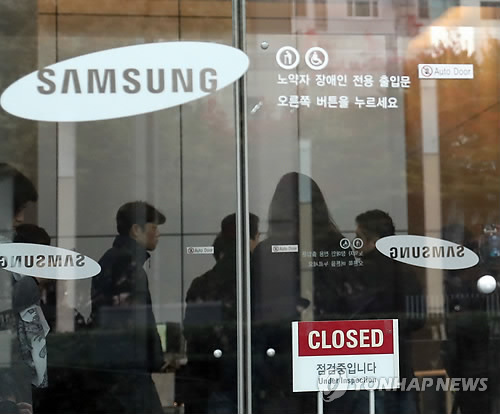South Korea prosecutors raided the headquarters of Samsung Group on Tuesday to investigate the extent to which the conglomerate was implicated in a political scandal involving President Park Geun-hye and her longtime friend Choi Soon-sil.
Around 20 investigators searched the office of Park Sang-jin, who is chief of Samsung Electronics and chairman of the Korea Equestrian Federation, and the offices of other executives located in the company’s Seocho office building that is the group’s headquarters. This is the first raid of the group’s building in eight years.
The offices of Samsung’s heir apparent Lee Jae-yong and the control-tower Samsung Future Strategy Office are also located in the building.
The probe came after reports that Samsung gave 2.8 million euros ($3.1 million) to a company called Widec Sports owned by Choi and her daughter Chung Yoo-ra. The money was allegedly used to buy a horse for the horse rider Chung. The state-run Korea Racing Authority was also raided on the same day on suspicion of providing support to Chung.
“We will faithfully cooperate with the investigators,” a Samsung official said, making no further comments.

As the prosecutorial investigation expands, the next target appears to be Hyundai Motor Group.
Hyundai’s vice president surnamed Park, who is in charge of communicating with government officials, was summoned as a testifier by the prosecution Tuesday afternoon.
Hyundai is among companies whose chiefs reportedly met with President Park in July last year. Park allegedly asked for donations from the chiefs at the unofficial meeting which Samsung Electronics’ Vice President Lee Jae-yong, Hyundai Motor’s chief Chung Mong-koo, LG Group Chairman Koo Bon-moo and Hanwha Chairman Km Seung-yeon reportedly attended.
Currently, 53 companies, including Samsung, LG, Hyundai, SK, Lotte, Posco and CJ, are found to have given a total of 77.4 billion won ($68 million) to the dubious Mir and K-Sports foundations reportedly set up by Choi.
Samsung Group gave 20.4 billion won, which was the most, followed by 12.8 billion won from Hyundai Motor, 11.1 billion won from SK Group and 7.8 billion won from LG Group.
The companies have so far said they reluctantly gave the money.
Samsung’s executive said on condition of anonymity, “There is no company (in Korea) which can stand against the administration. It is like the government compels us first and other companies follow.”
A Hyundai Motor official said, “There is an atmosphere that companies cannot resist (demands for donation). We normally watch how much Samsung gives first and then respond accordingly.”
He admitted, “We are kind of a silent accomplice,” but added, “one thing for sure is that we don’t want to give the money.”
Industry experts, however, questioned such claims.
“It is like an insurance for companies for possible or current issues such as hereditary succession or chiefs’ imprisonment,” said Park Sang-in, a professor at Seoul National University.
“The punishments for companies have been lenient so far because the courts have viewed them as victims. But, in order to break the longtime vicious circle of politics and corporate connections, the punishments should be much stronger,” Park added.
Last week, the civic progressive group People’s Solidarity for Participatory Democracy sued President Park and some conglomerates including Samsung for bribery charges.
“The victims are not the companies but the public. The companies bought the national authority with money in return for something,” said Kim Sung-jin, a lawyer and a member of the civic group.
Rep. Woo Sang-ho, floor leader of the main opposition Democratic Party of Korea, said Monday the essence of the Choi scandal was the connections between politics and corporates, demanding further investigation into companies involved in the political scandal.
“We should also look at whether the conglomerate-friendly policies -- so-called laws to boost economy -- came from the cozy relationship.”
By Shin Ji-hye (shinjh@heraldcorp.com)







